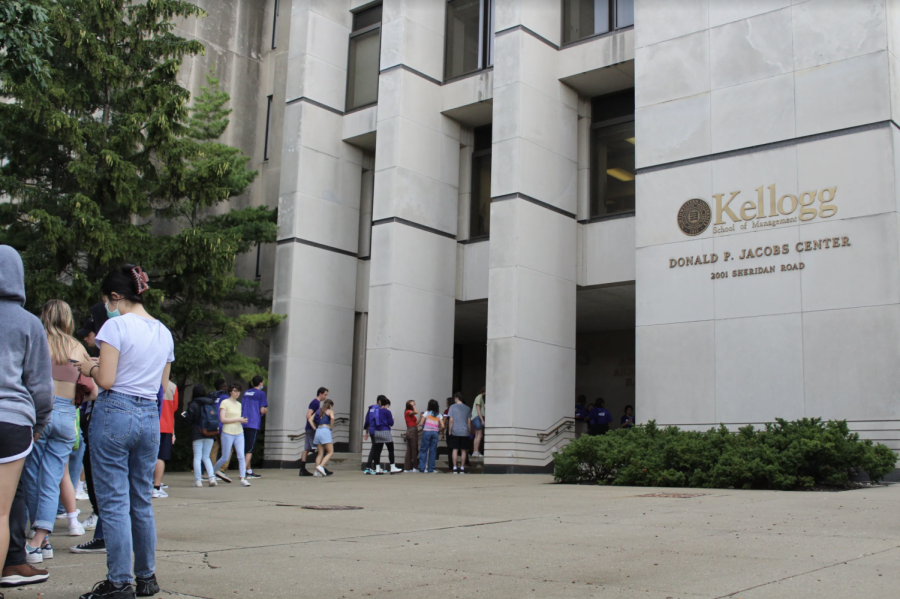Students discuss how COVID-19 effects can last long after initial infection
Angeli Mittal/Daily Senior Staffer
Students line up outside the Jacobs Center to get tested for COVID-19. Sally Kim, a SESP sophomore who experienced lingering side-effects from COVID-19, found out she had COVID-19 during a routine rapid test she took on campus during Spring 2021.
October 27, 2021
When SESP sophomore Sally Kim got COVID-19 last spring, her flu-like symptoms were “not too bad.” Seven months later, her physician diagnosed her with asthma resulting from the virus and she now uses an inhaler every day.
While most patients recover within weeks of contracting COVID-19, some continue to deal with a wide range of new or returning health problems that can last four or more weeks after the initial infection, according to the Centers for Disease Control and Prevention. These post-COVID-19 conditions are informally known as “long COVID.”
Out of more than 4,000 study participants, 13.3% of participants reported symptoms lasting at least 28 days, 4.5% lasted at least 8 weeks and 2.3% lasted at least 12 weeks, according to a March study.
Feinberg Prof. Igor Koralnik, chief of neuro-infectious disease and global neurology, opened the Neuro COVID-19 Clinic at Northwestern Memorial Hospital in May 2020. Feinberg third-year graduate student Jeff Clark, who conducted research with Koralnik, said they focused primarily on neurological manifestations in COVID-19 patients.
Clark said the most common neurological symptom associated with long COVID is “brain fog,” a term used to describe a patient’s decreased ability to work at their usual capacity, in addition to increased difficulty with attention, memory and multitasking. Other common neurological symptoms include fatigue, headache, change in taste and smell, depression and anxiety.
When Weinberg sophomore Kate Austin had COVID-19, she was not hospitalized but said she had what felt like a “bad cold that lasted way longer than it should have.”
Around a month after her recovery, Austin said she developed altered senses of smell and taste. Certain fruits like strawberries and watermelon, as well as her fruity-scented shampoo, started to taste and smell like “wet dog.” These distorted senses lasted several months, but are a common side effect after infection, according to a September 2021 study.
Kim found out she had COVID-19 during a routine rapid test she took on campus during Spring 2021. She said after the required 11 days of quarantine, she felt “totally fine” besides some wheezing and shortness of breath.
However, when she got back on campus in the fall, she began to pay more attention to her shortness of breath and lung-related side effects as she and her peers began coughing a lot.
“People believe there’s something within the walls of the dorm,” Kim said. “I was coughing like crazy, it was really bad.”
Kim said she went to her physician, who gave her several tests and diagnosed her with asthma from COVID-19. She said she now uses an inhaler every day.
Clark said post-COVID-19 chronic cough and shortness of breath are fairly common among the subset of people with long-lasting symptoms, and there is strong evidence for long-lasting lung damage in people who have had COVID-19. But because the disease is relatively new, there is not much scientific literature about a direct link of COVID-19 to asthma.
It’s difficult to get a truly cross-sectional survey, Clark said, because many people with COVID-19 were asymptomatic, weren’t hospitalized or didn’t test positive.
“For our studies, we’ve been drawing the population from the people who’ve sought care in the COVID clinic,” Clark said. “But that’s a specific subset of people, so you have to keep that in mind.”
Email: [email protected]
Twitter: @jansunnn
Related Stories:
— NU presents aggregate COVID-19 vaccination, testing statistics during Faculty Assembly
— Northwestern COVID-19 positivity rate sees a slight increase, otherwise remains steady
— NU researchers develop “ultra-rapid” COVID-19 test that demonstrated 100% accuracy


